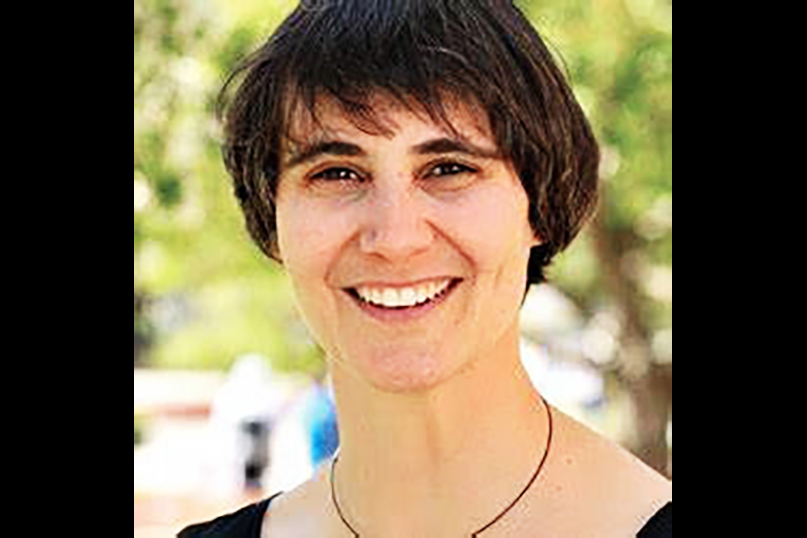
By Stacey Dresner
STORRS – When Edina Oestreicher was an undergrad at the University of Connecticut at Storrs she often spent time at UConn Hillel, the center for Jewish life on campus.
“Coming from Delaware, I didn’t know a lot of people, in fact, I didn’t know anybody. UConn is a huge place so Hillel was a great place to go that felt like a smaller community, where I could meet people, go for a Friday night service or a bagel brunch or movies or whatever,” she recalled. “It was great just knowing that it was there for me.”
Now 30 years later, Oestreicher has come full circle – on June 1 she was named executive director of UConn Hillel.
After serving for many years as an administrator in higher education, most recently as vice president of student affairs and dean of students at the University of Bridgeport, Oestreicher says the new position is a perfect fit.
“It just felt like such a terrific opportunity me, with my extensive experience in higher education and student affairs along with my involvement for most of my life in Jewish causes,” she says, calling the fact that she is a UConn alum “icing on the cake.”
“Edina has been successful in her career connecting with students and the community at large. She is driven, passionate, articulate and genuine and this helps her bring out the best in all around her,” says Henry Mondschein, UConn Hillel board chair.
Oetreicher admits that starting her new post during the Covid-19 pandemic has been challenging.
“We’ve been spending a lot of time figuring how we are going to be engaging students during this time of Covid-19,” she says. “I just learned from the university that no in-person events or social gatherings are going to be permitted through Sept. 20 at the very earliest. So I’ve been working very closely with our student board and the UConn community to develop ways to engage both [current students] as well as the 140 incoming students who self-identify as Jewish. We’re working on our mentoring program, which matches upper class students with incoming students to welcome them and help them feel connected. We are planning a lot of virtual events so they can get to know each other, and we are adapting our scheduled events to make them virtual.”
A native of Wilmington, Delaware, where her family belonged to Beth Shalom, a Conservative shul, Oestreicher had a “traditional Conservative” upbringing.
“I was very involved,” she says. “My parents were very involved and still are. They both were presidents of the congregation; my mother was president of Sisterhood… It inspired my engagement in Jewish life.”
She went on to major in communication sciences at UConn. While a student there, she served as a peer educator for the women’s center on campus, leading programs on sexual harassment, sexual assault, and dating and domestic violence. When she graduated, Oestreicher was asked to become coordinator of what his now the Violence against Women Prevention program.
After four years, she left that position to teach environmental education at the Connecticut State Museum of Natural History, also based at UConn, followed by a few years at Planned Parenthood in Willimantic working as an HIV counselor and family planning counselor.
When her husband – also a UConn graduate – got a job at the University of Bridgeport as director of residential life, they relocated to that area. Today, Oestreicher lives with her husband David in Orange. They are the parents of two grown daughters.
“We moved down to Bridgeport and were there for maybe a month and then another serendipitous opportunity opened up and I was hired to be director of [the University of Bridgeport’s] campus activities, which was really an awesome job … getting back on a college campus and working with college students and student affairs.”
She spent the next 23 years at the University of Bridgeport in a variety of positions, while also earning a master’s degree in counseling.
“I love working with college students and being part of their lives and their development. It is such a transformative stage in their lives,” she says.
Thirteen years ago, she became a contracted facilitator for the ADL’s “Words to Action” program, traveling around the state working with adolescents, teens and adults.
“It’s working with students to understand what is antisemitism – what are the forms that it can take, and how to respond to it; who are allies in our schools, in our shuls and our communities?” she says. “It’s really for young people who have heard or seen things that they weren’t sure meets the definition [of antisemitism]. It is about empowering them to have a voice and to stand up and address it in ways that are meaningful for them.”
Oestreicher has certification in case management and intervention from the National Behavioral Intervention Team Association; Civil Rights Investigator Training; Mediator Training Certification from the Connecticut Mediation Center, among other certifications.
Then, in the summer of 2019, the University of Bridgeport went through financial difficulties and following a restructuring, Oestreicher’s position was eliminated.
She heard about the Hillel position through Judy Alperin, executive director of the Jewish Federation of Greater New Haven. A member of Congregation Or Shalom and chair of its adult education committee, Oestreicher had connected with Alperin while helping to organize the community’s Kristallnacht memorial, held at Or Shalom and co-sponsored by Federation.
Over the past month, Oestreicher has been “working with faculty and staff to identify ways we can do joint programming,” she says. “I think that is so important for students when you are able to bring organizations together. It really just creates a vibrancy when you bring students together to learn from each other.”
That collaboration has already begun.
On June 26, UConn Hillel celebrated a Zoom Shabbat with UConn’s African American Cultural Center.
“It was the first of several events that we are going to host with them to start conversations around racial justice and police brutality. We, the Jewish community, need to learn to be more aware and educated and be good allies for our colleagues.”
But with nearly 2,000 Jewish students at UConn, Oestreicher’s commitment is, first and foremost, to provide leadership, vision and strategy for engaging all UConn Jewish students and creating a pluralistic, vibrant community.
“So much of what we emphasize,” she says, “is that Hillel really is a place where – whether you are looking for a service, you keep kosher, or have never been at shul a day in your life, don’t know a word in Hebrew and are not even sure what being Jewish means to you – it’s a place that you would feel welcome and at home, regardless of your past in terms of your Jewish identity.”
Main Photo: Edina Oestreicher








 Southern New England Jewish Ledger
Southern New England Jewish Ledger









